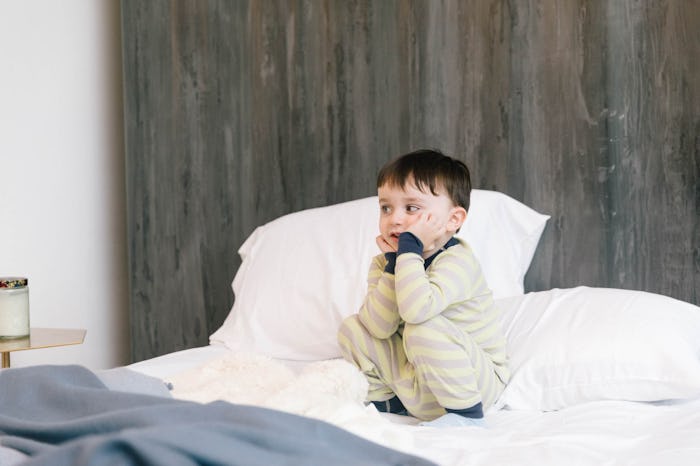Life
This Is The Grossest Thing In Your Toddler's Room, & OMG Ew
It's not their fault, but there's no denying it: toddlers can be super gross. Icky, sticky, smelly, poopy — such is life. If you're anything like me, you spend a heck of a lot of time cleaning snot and spit up, and even more time researching how to safely and effectively clean your kid's various items (toys, bottles, toothbrush, high chairs ... the list goes on until you pass out, exhausted, in a half-way clean house). So what's the most in need of attention? Bath toys? High-chair tables? Sippy cups? Actually, the grossest thing in your toddler's room can make the whole family sick. Pediatrician Dr. Jarrett Patton of Pennsylvania explains why it's crucial to sanitize your changing table.
Parents rightly calls diaper changing an "inherently germy activity," and recommended keeping hand sanitizer nearby to keep diaper germs from spreading to your whole house. "Although most parents clean their changing table frequently, this is an area where germs can spread quickly to others," explains Patton. In particular, he worries about the norovius and rotavirus, "which tend to cause diarrheal illnesses every winter."
While it's important to know about these germs, there's no need to panic (or buy bucketfuls of bleach). "This time of year is wonderful, but I am trying to help people stay sane and not stressed out," says Patton.
According to the Centers for Disease Control and Prevention (CDC), the norovirus by any other name — food poisoning, or a stomach flu — is the most common cause of diarrhea, vomiting, and other serious stomach-based unpleasantness in the United States. "It only takes a very small amount of norovirus particles (fewer than 100) to make you sick," the CDC reported, and parents and kids can easily pass this nasty bug to each other across the changing table. Unfortunately, there's no drug treatment or vaccine to protect you against this microscopic villain, but it really doesn't stand a chance if you sanitize your hands and the surface below your child after each change. If your toddler touches their private parts mid-diapering, wipe their hands with sanitizer too, Parents wisely recommended.
Rotavirus is another reason to disinfect your changing table right away. Unlike the norovirus, your child was probably vaccinated against the rotavirus, which also lives in stool (poopy diapers). The rotavirus can live on surfaces for days.
"Those pesky rotaviruses and noroviruses can often wipe out a household," observes Patton. He recommends frequent hand-washing for parents and kids. Remember, you don't have to be a perfect housekeeper to keep the family healthy — you just have to clean the stuff that gets really icky.
The changing table is probably the grossest thing your toddler or baby comes into contact with on a daily basis, but parents can't neglect toys, high chair tables, and other surfaces, which can all become a home for viruses.
"Using dish detergent is a safe practice for cleaning toys and surfaces, but make sure that they are completely dry before handing them back to the child," Patton advises. Additionally, watch out for bath toys, which aren't cleaned as often as changing tables, and can house dangerous mold and mildew. One easy trick to make bath toys more sanitary is to plug the hole in your child's rubber ducky with glue (don't worry, it will still float). Also, don't be afraid to run bath toys through the dishwasher periodically.
What if you don't change your baby on a changing table? Instead of using the bare floor or your bed, slip a disposable pad under your kid to prevent troublesome viruses from spreading. Bottom line: remembering to wash your hands and practice good hygiene around the changing table is a big help in keeping everyone healthy and safe.
Check out Romper's new video series, Romper's Doula Diaries:
Watch full episodes of Romper's Doula Diaries on Facebook Watch.
